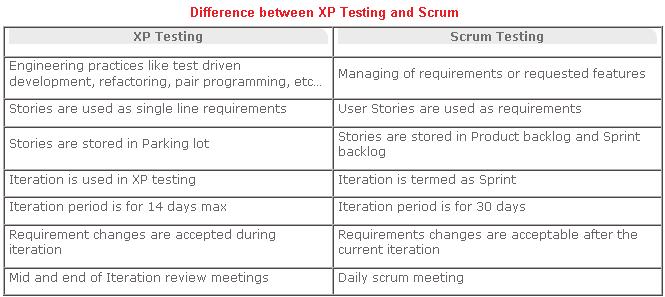Agile is a type of methodology. In this methodology
testing will be continue along with development life cycle. Iteration of
testing and development will be continuing till the project deliver..
Agile Testing: This is the only testing which starts
at the starting of the development phase and will be continue till the end of
the development mean in this testing executed the test cases along with the
development not after the code work completion. This is not a sequential
testing but it is continuous testing.
Following are the Methodologies of Agile Testing:
i.
Scrum: is the type of agile
method of development. Management manages the task and team according to
limited time period. Mean delivered the project on time with minimum effort and
high quality.
Scrum team divided into three parts:
i.
Scrum Master: Responsibilities
of master is to set up the meeting of team, process meeting forward and
removing the hurdles if available.
ii.
Owner of Product: owner of
product will make work orders, prioritizes of work orders and delivery in
responsible hands.
iii.
Scrum Team: Management will
allow who will work on the work orders and what time duration will be
sufficient for received work orders.
Work orders or product backlog: This is the repository
which is used to handle or tracked the work orders or requirements.
Explain the phase of Scrum Testing:
i.
Test Case Design: Designing the
test cases is the first phase of scrum testing
ii.
Execution of Test Cases: Created
test cases will be executed now.
iii.
Test cases executed as automated:
If required and available then test cases need to execute automated.
Charts for Sprint Burn down:
It is the updated of scrum mean how much work is completed
and how much is remained and how and when remained will be completed.
Practices on Scrum:
i.
Sprint Planning:- Product
backlog; Team, Structure and Capabilities; Business Conditions
ii.
Sprint:- Sprint Backlog;
Sprint burn down charts; 30 days plan
iii.
Daily Scrum Meet:- Daily 15
minutes status meeting; Tasks discussion and impediments; Decision Making
iv.
Sprint Review Meeting:- Review meeting;
Informal set-up as and when required
v.
Sprint Retrospective Meet:-
Process improvement; Scrum master responsibility; Prioritization on the tasks
and decisions\
Flow of Scrum Process:
i.
Sprint mean iteration of a scrum
ii.
Product backlog mean all requirement
details for product
iii.
Sprint converted into sprint backlog
with product backlog selection
iv.
Decided sprint backlog required team
work
v.
Daily work checked by Team
vi.
Created team delivered project functionality
at the last of sprint
XP or eXtreme Programming:
It contains coding, unit testing
and system testing. Already decided time duration and each phase have some
minor / major functionality in proposed application software.
eXtreme Programming Phases:
i.
First Planning for all work
ii.
Now Analysis the planned work.
iii.
Designing Work
iv.
Execution for coding, and unit
testing and test scenarios manually
v.
Finally Wrapping and Closure
Difference between XP Testing and Scrum:
 |
| Difference between XP Testing and Scrum |
|
|
|
|
|
|
|
|
|
|
|
|
|
|
||
|
|
|
|
|
|
|
|
|
|
|
|
|
|
|
|
|
|
|
|
|
|
|
|
|
|
||
|
|
|
|
|
|
What is, Methodologies, Definition of Agile and Agile Testing, Difference between XP Testing and Scrum, XP or eXtreme Programming Phases, practices, flow and phase of Scrum Testing, Charts for Sprint Burn down, Scrum Master Team, product owner










No comments:
Post a Comment